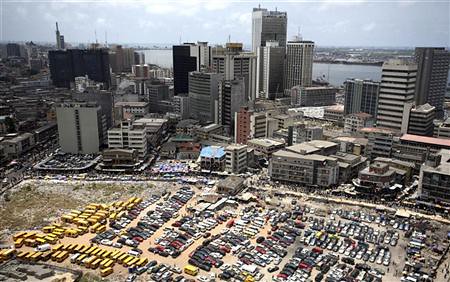
An aerial view shows the central business district in Nigeria's commercial capital of Lagos, April 7, 2009. REUTERS/Akintunde Akinleye , a photo by Pan-African News Wire File Photos on Flickr.
Nigeria Gets Significant Amount Of FDI In Africa, Says UN Report
SATURDAY, 30 MARCH 2013 00:00 FROM LAOLU AKANDE, NEW YORK NEWS - NATIONAL
Nigerian Guardian
NIGERIA is receiving “a significant amount” of the Foreign Direct Investment (FDI), that come into Africa, including the expansion of Russian financial influence in the country, according to a United Nations (UN) report on global investment released during the week.
The UN report that monitors global investment trends has also disclosed that FDI going into and out of emerging economies like Brazil, Russia, India, China and South Africa (BRICS) remain on the rise, including the expansion of Russian banks in Nigeria.
The report produced by the UN Conference on Trade and Development, UNCTAD was released last week in time for the 5th BRICS Summit, which started Tuesday in Durban, South Africa.
According to the report, “the expansion of Russian transnational companies, (TNC’s), in Africa is fairly recent but rapid, reaching $1billion in 2011.”
It added that “the arrival of Russian TNC’s have been motivated by a desire to enhance raw-material supplies and to expand to new segments of strategic commodities, as well as a desire to access local markets.”
In specific terms, the UN report noted that a good example is the expansion of Rusal, regarded as the world’s largest aluminum producer, which now has operations, according to the report in Angola, Guinea, Nigeria and South Africa.
The report left out the ruling of the Supreme Court that upturned the ownership of Rusal in a case brought against it and the federal government by a US-based Nigerian investor, Dr. Ruben Jaja and his US firm BFIG.
But the report also noted that Russian banks are also moving into Africa.
It mentioned “Vneshtorgbank, for instance, opened the first foreign majority-owned bank in Angola, and then moved into Namibia and Côte d’Ivoire, while the Russian Renaissance Capital owns 25% of the shares in Ecobank, one of the largest Nigerian banks.”
Generally the report showed that foreign investment from BRICS into Africa represented 25 per cent of Africa’s inflows last year, with most funds going to the manufacturing and services sectors.
Also discussing the influence of China’s FDI in Africa, the report said “Chinese FDI stock in Africa stood at $16 billion by the end of 2011,” but added that South Africa is the leading recipient, followed by Sudan, Nigeria, Zambia and Angola.
On Nigeria, the report said “a significant amount of FDI stock are also present in Nigeria and in two South Africa’s neighbours: Mozambique and Zimbabwe.”
The UNCTAD Global Investment Trends Monitor (GITM), which focused on BRICS FDI to Africa, also examined the relative importance of FDI in the continent in the total outward FDI of the BRICS.
“While in the early 2000s, FDI from the BRICS countries to Africa only accounted for a negligible share of the group’s total outward FDI flows. From 2009 to 2011, it rose to 4 per cent, which is higher than the share of Africa in the outward investment of TNC’s from the United States and EU.
According to the UN, this latest GITM shows that over the past decade, FDI going into BRICS has more than tripled, totaling $263b in 2012. This figure represents 20 per cent of world FDI flows, and is a significant increase considering the fact that it was only 6 per cent in 2000.
Meanwhile, investments from BRICS into other countries have climbed from $7b in 2000 to $126b in 2012, rising from one per cent of world’s flow to nine per cent, with China and Russia accounting for the majority of these investments.
While labour costs in Africa may not differ significantly from those in the in firms’ home economies, the duty-free, quota-free access of African countries and China’s zero-tariff measures for Africa’s least developed countries (LDC’s) have generated manufacturing investments.
Brazil, for example, has expanded its business in the new African ethanol industry in countries like Angola, Ghana and Mozambique; China is one of the top investing countries in LDC’s such as Sudan and Zambia; an Indian company recently acquired an African mobile phone network and now Russian banks are expanding to another African country besides, Nigeria, that is Côte d’Ivoire.
The report noted that this growing relationship between BRICS and Africa is likely to be reinforced in the future due to the rapid economic growth and industrial upgrading currently taking place in BRICS countries.
“The rise of FDI in manufacturing, which has positive consequences for job creation and industrial growth, is becoming an important facet of South–South economic cooperation,” it says.
However, the main share of BRICS’ outward investment is still in developed economies, with 34 per cent of their stocks going to the European Union. The report further noted that these investments are in large part driven by “market-seeking motives” as well as mergers and acquisitions across borders.
No comments:
Post a Comment